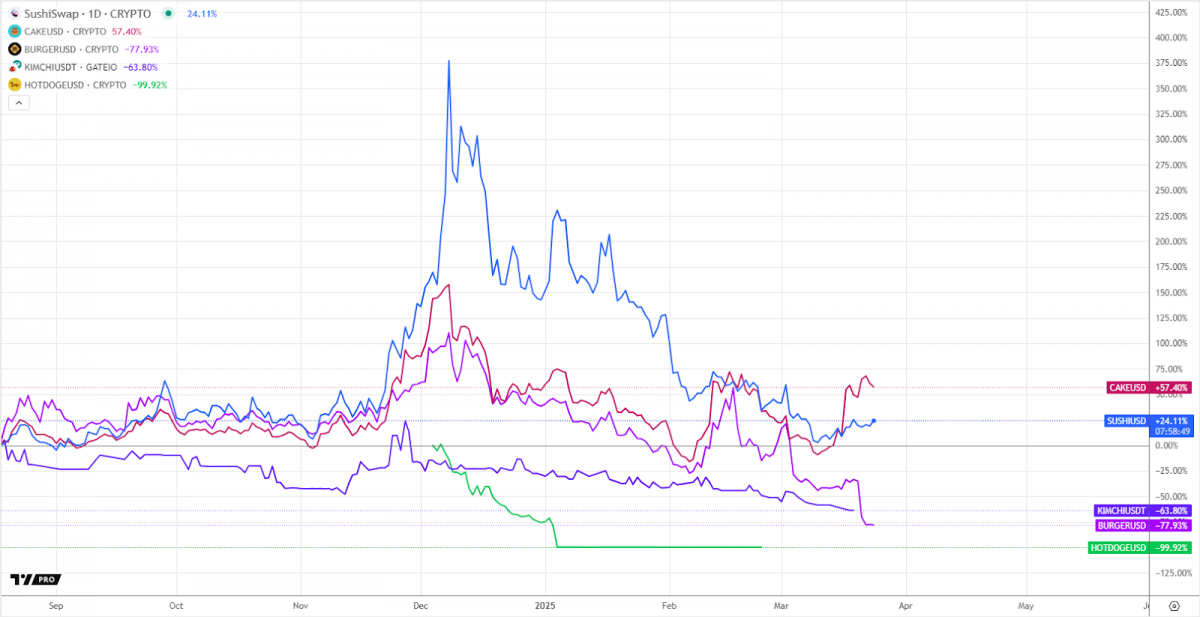The cryptocurrency world is full of unusual projects — some even inspired by food! Believe it or not, there are coins named after dishes, products, and even technologies that connect blockchain with the food industry.
5 Food-Inspired Cryptocurrencies
1. SushiSwap (SUSHI) is a decentralized exchange on the Ethereum blockchain, created as a fork of Uniswap. It allows users to trade tokens, provide liquidity, and earn rewards.
Key features:
- Automated market maker (AMM) — Users can add liquidity to pools and earn income.
- Liquidity migration — In 2020, SushiSwap attracted liquidity from Uniswap, causing SUSHI’s price to surge.
Additional products:
- Kashi lending — Crypto-backed lending.
- BentoBox — A token “storage” that integrates with dApps.
The project’s name and logo are inspired by sushi. Chef Nomi, the anonymous creator, later handed control over to the community.
2. PancakeSwap (CAKE) is a popular DEX on the Binance Smart Chain (BSC) that offers token swaps, staking, and lotteries.
Key features:
- Token swap — No KYC verification required.
- Liquidity farms — APY of over 100%.
- Lotteries and NFT marketplace — Additional earning opportunities.
The name comes from pancakes, and the platform’s interface follows a fun food theme. Users can “bake” (stake) CAKE tokens to generate passive income.
PancakeSwap is the most popular DEX on BSC, with daily trading volume exceeding $1 billion.
In 2021, PancakeSwap overtook Uniswap in total users due to its low transaction fees.
3. BurgerCities (BURGER) is another DEX on the Binance Smart Chain that allows users to trade tokens and participate in governance.
Key highlights:
- The first DEX on Binance Smart Chain (launched in 2020).
- Uses an AMM model, similar to Uniswap but with lower fees.
BURGER tokens can be used for:
- Voting on protocol changes.
- Staking and pharming of liquidity.
As the name suggests, BurgerCities is themed around burgers. Users can “cook” (stake) their BURGER tokens to generate income.
However, in 2021, a smart contract vulnerability led to a $7.2 million hack. Despite the competition from PancakeSwap, it remains a niche project.
4. Kimchi Finance (KIMCHI) was launched on Ethereum as a fork of SushiSwap, offering high APYs on liquidity pools.
Key features:
- SushiSwap fork launched in 2020.
- APYs of up to 1000%.
- Rapid decline due to lack of real utility and security concerns.
Named after the Korean dish kimchi, this project quickly gained popularity but soon faced major security issues. Developers withdrew liquidity just a few weeks after launch, bringing down the token’s price. Kimchi Finance is a classic example of pump-and-dump in DeFi.
5. Hotdoge (HOTDOGE) is a meme coin inspired by Dogecoin but with a gastronomic twist. While it had no real use case, it still attracted a strong community.
Interesting facts:
- Created as a joke but gained traction among speculators.
- Holders called themselves “Hotdoggers”.
Like most meme coins, HOTDOGE’s value depended on hype and market activity rather than real-world utility.

Food tokenization: how blockchain is transforming the food industry
Food tokenization involves recording food or suppliers on the blockchain. This technology helps:
- Track origins (from farm to store).
- Prevent counterfeiting (verifying organic or high-quality products).
- Tokenize agricultural goods (farmers can raise funds through DeFi).
Blockchain projects for tracking products:
- VeChain (VET) — Partnered with Walmart China for product quality control.
- IBM Food Trust — Used by Nestle, Carrefour, and Unilever for supply chain traceability.
- OriginTrail (TRAC) — Helps verify organic and locally sourced products.
Restaurants accepting cryptocurrency
With the Bitcoin price constantly fluctuating, more restaurants are starting to accept crypto payments, making it easier than ever to buy your favorite meals with digital assets. Some well-known restaurants that accept cryptocurrency include:
- Burger King — Accepts Bitcoin and other cryptocurrencies in select locations.
- KFC (Canada) — Ran a limited-time “Bitcoin Bucket” promotion in 2018.
- The Pink Cow (Tokyo) — One of the first restaurants to accept BTC.
- Subway (some U.S. locations) — Allows crypto payments via BitPay.
Cryptocurrencies and food are linked not only by creative names but also through real-world applications. From food tokenization to buying a burger with Bitcoin, blockchain is slowly making its way into the culinary world. Who knows? We may see even more crypto-food projects in the future.

Disclaimer: The views expressed in this article are those of the author and may not reflect the views of the CryptoTotem team. This article is for informational purposes only and is not intended to be used as legal, tax, investment or financial advice. The author or the publication does not hold any responsibility, directly, or indirectly, for any damage or loss caused or alleged to be caused by or connected with the use of or reliance on any content, goods or services mentioned in this article. Readers should do their own research before taking any action on this matter.
